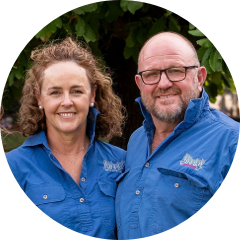Evaluating novel approaches for drought resilience through capitalising on an established network of long-term trials.
Term
2024-2028
Project Officer
Jane McInnes
WHY THIS PROJECT IS IMPORTANT
While low rainfall sets the upper limit on production in Australian systems, most crops still fall short of this water-limited potential due to inefficient use of rainfall and stored soil moisture. Overcoming soil constraints can lead to modest improvements in the extraction of soil water, which can then result in significant yield improvements (for example, late-season soil water uptake can produce 50 kg grain/ha/mm).
This project aims to promote new practices that mitigate drought impacts and increase resilience, with a local focus on cover and companion cropping to improve soil health and soil water storage.
Addressing subsoil constraints — and the associated changes in access to soil water in different soils — often requires a considerable period of time to change key soil properties including organic matter, infiltration rates and water holding capacity.
Long-term trials are therefore key for understanding the effect of amelioration practices on drought resilience in different farming systems, due to climate variability at local trial sites. A long-term approach is also helpful when evaluating economic benefits of treatments in the cropping system.
Project Focus
This project supports a long-term replicated field trial originally established at Burramine (near Yarrawonga) in Victoria in 2020, as part of the Building resilient soils and enhancing carbon stocks in cropping systems through plant diversity and Plant based solutions to improve soil performance through rhizosphere modification initiative by the Soil CRC.
The project is also supporting six other long-term trials in WA (East Pingelly, Bullaring, Dandaragan), NSW (Parkes, Lockhart) and Victoria (Birchip) that are addressing multiple soil constraints to improve the efficient use of soil water.
Burramine trial
The Burramine trial is investigating the role of intercropping and summer cover crops to increase soil carbon, water storage, and water use efficiency. A sister-site has also been established by Central West Farming Systems near Parkes (NSW).
The Burramine trial is:
- Evaluating long term field data (6–8 years) and using APSIM and other scenario-modelling to quantify the mitigation of long-term financial risk for farmers.
- Assessing soil water content in response to cover and companion cropping, using novel soil water-sensing equipment developed by the Soil CRC.
- Comparing the impact of these management treatments and practices with conventional farming practices.
- Examining the financial viability of cover and companion cropping to increase productivity and drought resilience by mitigating multiple soil constraints.
- Supporting extension activities
Ultimately, the project aims to improve drought resilience by long-term trialling of key technologies and practices that support enhanced agricultural productivity, profitability and sustainability during drought, as well as faster recovery from drought.
Investigating such approaches could reduce the yield gap between current and water-limited yield potential and build soil and drought resilience, nutrient holding capacity and nutrient recycling/efficiency, thus delivering economic and sustainability benefits to farmers.
Find out more
For further information about this project, please contact Riverine Plains Senior Manager, Jane McInnes, by emailing jane@riverineplains.org.au.
Project investment
This project is supported by the Soil CRC, through funding from the Australian Government’s Future Drought Fund.
Partners
Project participants include Murdoch University, Birchip Cropping Group, Central West Farming Systems, Corrigin Farm Improvement Group, Facey Group, Riverine Plains, West Midland Group, Southern Cross University and University of Newcastle, University of Southern Queensland and University of Tasmania.
MORE ON Soils & Grains
Our research enhances food production, increases environmental resilience and improves community connection across the Riverine Plains. See how our research creates impact.
-
Grains
Sustainability
-
Grains
Business
-
Grains
Sustainability
-
Grains
Livestock
-
Grains
Livestock
-
Soils
Sustainability
-
Soils
Sustainability
-
Grains
Sustainability
-
Grains
Business
-
Grains
Sustainability
-
Grains
-
Grains
-
Soils
Grains
-
Soils
Sustainability
-
Grains
Soils
-
Drought
Grains
-
Soils
Grains
-
Grains
-
Grains
Soils
-
Soils
Grains
-
Fodder
Grains
-
Grains
-
Soils
Sustainability
-
Grains
-
Soils
Sustainability
-
Grains
Soils
-
Sustainability
Grains
-
Grains
Sustainability
-
Soils
Grains
-
Soils
Climate
-
Grains
Sustainability
-
Soils
Climate
-
Livestock
Grains
-
Grains
Soils
-
Sustainability
Grains
JOIN RIVERINE PLAINS
Riverine Plains provides opportunities to see new research and innovation, connect with rural communities, and attend informative events.


